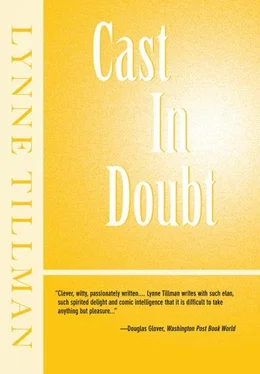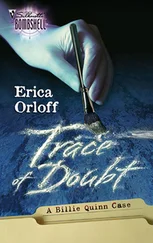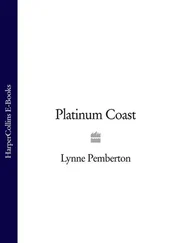I pride myself on being an older man who can rise easily on occasion. I must repeat this to Gwen, which reminds me of why I invited her here. How good it will be to discuss the intimate details of life with a true friend who is, in her way, as strange as I. And she is only twenty years younger, not forty years or more younger than I, as is Helen. Gwen has reached the age of truth. I like to think of my forties that way — the age of truth. And what will Gwen’s truth be?
I must ask Nectaria to find a room for her since it won’t do to have her stay here. I have my habits, my routines which are fixed, to some extent, although they can be broken every once in a while. There is not enough space, in any case, and Gwen will want her own room, I’m certain. I hope she is no longer using sleeping pills, for they make her cranky in the mornings. Gwen has dreadful dreams, replete with monsters and odd forms of execution, and years ago she became habituated to sleeping pills and has taken them off and on ever since. I’ve never asked Helen about her drug usage; I assume she partakes now and again. But Helen does not behave as if she uses downers, as Gwen calls them.
As I ruminate on Helen and drugs, I’m struck by a brilliant idea — I could write a crime story based on the alleged suicide of a twin. Pills, of course. The truth of how the twin died will become the object of Stan Green’s quest. He must discern whether or not the twin had a natural unnatural death, a true suicide, or whether it was foul play, and the surviving twin sister — I’ll make them twin brothers, to disguise Helen — actually and cleverly did her — him — in, by mixing up some pills, let’s say.
How can I think like this? I am a grotesque creature.
I walk to the window and discover Helen standing on her terrace, looking in this direction. I wave and we agree in sign language to meet later for dinner. She seems excited. Could she possibly have found out about my meeting John the other day? How could she? That is paranoia.
Nectaria has set up a shower on the roof for those of us who have been here forever. It is remarkable how being on the roof, on top of the world, as Yannis likes to exclaim — his innocence exists in such expressions — on top of the world and naked as a buck, with the sun still strong but not hot, with cool water drizzling down one’s body, how one feels safe and clean, truly clean. Pure. I soap thoroughly and scrub here and there, over and over. A Lady Macbeth I am not, because my hands are clean, there is no blood, not even a stain, no visible sign. I am not, I convince myself, a bad man. And when I towel off and breathe the fragrant Cretan air, air that brilliant ancients also breathed, why I know myself to be in a line of humanity of which I can be proud. I wrap my terry around me and descend to my apartment.
I splash my face with the after-shave Gwen sent me, English Leather, which is, I am sure, one of her subtle jokes. I put on my lemon-yellow Brooks Brothers shirt, my yellow-and-white cravat, my white linen jacket, and I am as good as a Graham Greene character or even Greene himself. I often like to dress for dinner, especially after having been rather solitary. In a sour mood, Yannis will stay home, but he will show up later, as he usually does, I am sure. He ignores me as I leave the apartment, but I am inured to him at the present moment.
Roger is seated at a table far from Helen and me. He seems to be in a pensive mood. He’s reading a Greek newspaper. He is unhappy, poor dear; he supported the junta and its regime, and liked to say that on this he and the Greek people agreed. Both he and they, he will still insist tiresomely, knew the country needed the restoration of order and a strong hand. What battles Roger and I have had about the censorship of news! Roger could be reading about the wreckage of a Bronze Age ship, recently discovered off Hydra; it is thought to be the earliest known ship-wreck ever found. Probably Roger wishes he had gotten there first, to grab the spoils.
He and I barely nod to each other. It’s a mode either of us might adopt which means nothing. Helen has clipped her hair back and seems even younger and more vulnerable. Christos bends over her and takes her order, looking down her shirt, I think. She doesn’t, of course, wear a brassiere. Occasionally Helen glances at Roger, who has also only nodded to her; she is not used to this from him. I explain, not caring if he hears, that this is not unusual for Roger and she must not take his behavior personally. She says nothing.
I ask what has she done today. Helen has taught two English classes. I believe she landed the teaching job by lying; she must have told the school she had a college degree. It’s a real drag, Helen says. Her students have to learn how to write formal business letters; it’s in the syllabus, and she must follow it. Her students are grateful for each bit of information she imparts, Helen thinks, as if one of those bits might transform them into rich Americans. This is how they model themselves upon America. I jocularly suggest that when Ari Onassis and Jackie Kennedy married, they were anointed the king and queen of Greece, and, in a sense, they have encouraged this avariciousness. I go on about Onassis’ having an unhappy, jealous daughter; it augurs badly, I say. Helen has compassion for Christina.
I find it hard to be sorry for the very rich, but when I was Helen’s age I was also more generous. I bet Christina kills herself, Helen says knowingly. Suicide? I repeat. She nods and strips her fish off the bone. I could prolong the discussion about suicide, but I am too guilt-ridden to do so. How could I even think about a book based on Helen’s misery, her alleged misery, that of the suicide of her sister or the murder of her sister, her twin? I swallow my wine and pour some more, to wash down my guilt. Helen may be very very rich. I hadn’t seriously considered that before. I know that Roger has. He has a nose for such things.
She is not disturbed by Roger’s impolite behavior. But how does she see him? I wonder. Perhaps she is also undisturbed by John’s near suicide. She seems to be. But how could she be if it may parallel even slightly her sister’s, her twin’s?
In profile Helen’s features are perfect. The blue sky, darkening swiftly now, surrounds her moodily. It is as if she were untouched by the cruelty and meanness of life, by the sailors, by John, by death. Perhaps everyone is until one reaches a certain age. That must be it — at a certain age the burden of everything that has happened to one in life achieves a critical mass; suddenly it collapses upon one and, bearing down heavily, weighs one down, and one experiences the enormity of it all. And then we understand. If we do. And with that, the pungent sensation of aging commences.
Still, Helen’s reticence marks her as special if not unique, like a piece of art. I treasure her though she undoubtedly has a flaw, not unlike the golden bowl. I’m not sure what her flaw is or how to judge it. Yet I know she has one, perhaps many. These will deepen with age. But she has time, a great deal of time. It is pleasant to sit with her, to let time drift. I am spending her time. I look with her toward the sea. We are silent for long periods. She respects silence. She may be mulling things over or thinking of absolutely nothing. I do find her reticence akin to art, as art makes order out of chaos, and I think there must be a great deal of it in her life — chaos, that is.
The sea stretches before us. I meditate upon the artists, like Turner and Monet, who painted sky and sea, who were bewitched by the grandeur of nature, its unfathomability, its mystery. Nature hides the sea’s deeper life from us; normally we see only a watery surface. A painting reflects that surface, containing the chaos we fear beneath. I rely on art and need order, but I’m not sure that Helen does, in the same way. Or if she does these needs haven’t yet made a definite impression on her character. She never speaks of art, of paintings, just of music, movies and television, and books, occasionally. At least she reads them.
Читать дальше












